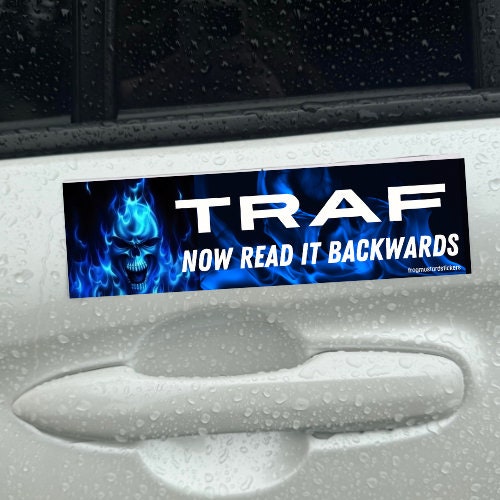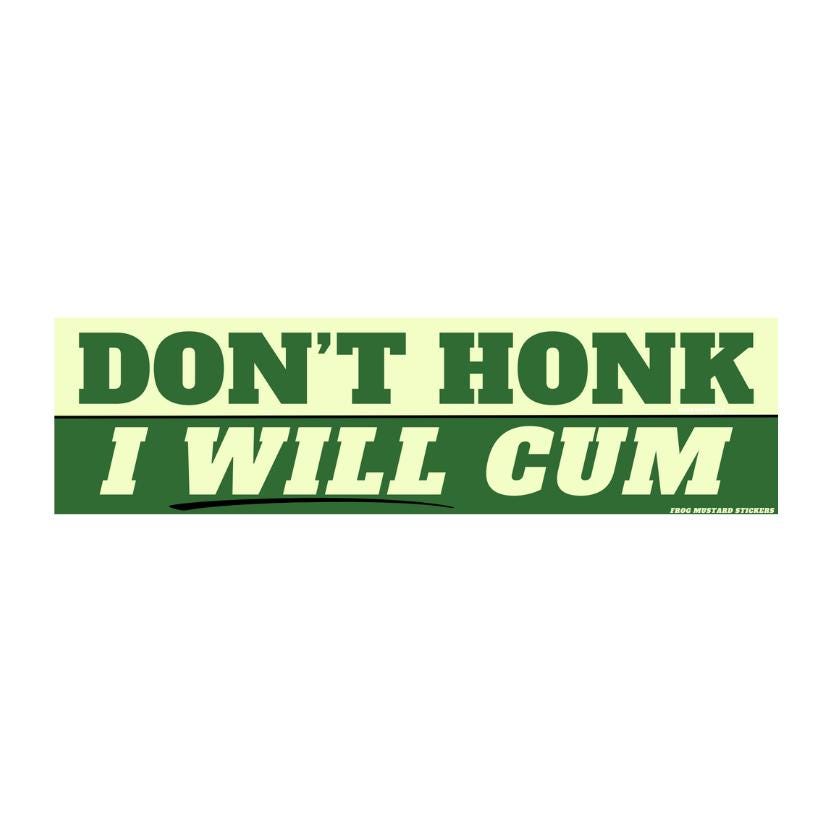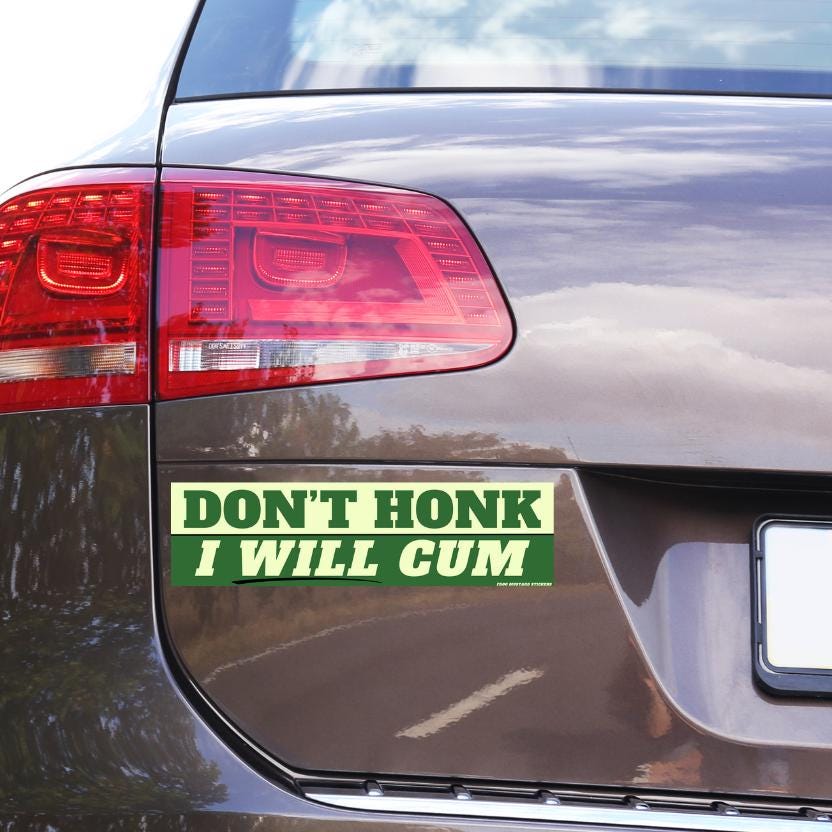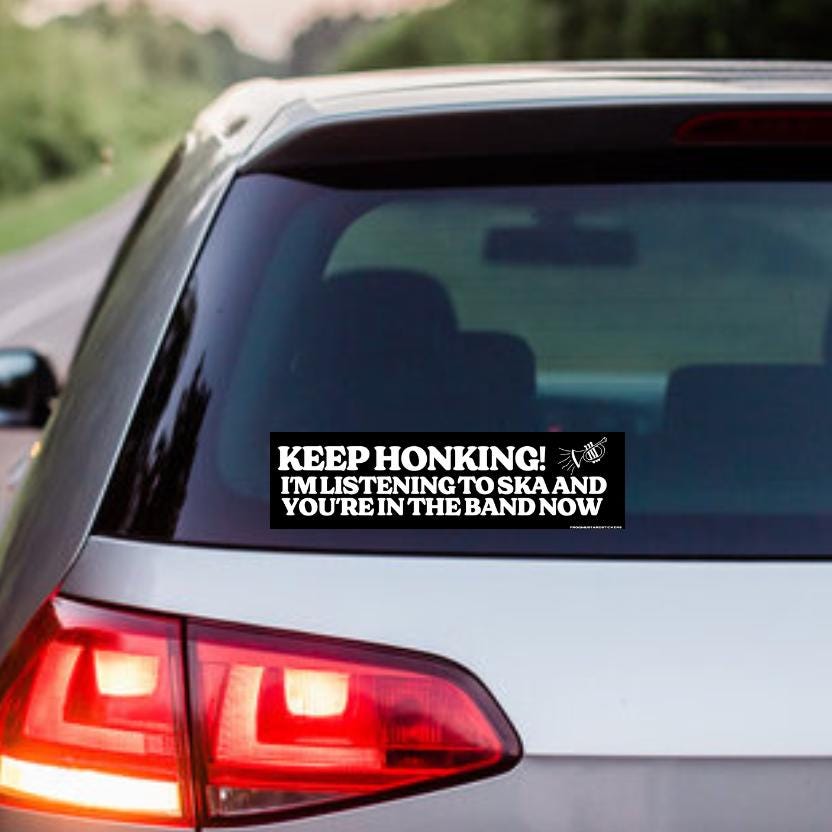Bumper stickers are everywhere. Whether it’s a funny bumper sticker that makes you laugh at a red light, a coexist bumper sticker that calls for unity, or a custom-made bumper sticker shouting your most unhinged opinions into the void, one thing is certain: people have a lot to say, and they’re saying it on their cars.
But every so often, someone claims that certain bumper stickers are illegal. Maybe you’ve seen stories about drivers being pulled over for a political sticker, or a viral post claiming that offensive bumper stickers can get you fined or arrested.
So, let’s get to the bottom of this: Can you get in legal trouble for having a bumper sticker? And have people actually been ticketed, arrested, or sued over them?
The short answer? No. Your bumper stickers are protected under free speech laws in the U.S.
But let’s break it down.
Bumper Stickers & the First Amendment: What’s Actually Legal?
The First Amendment protects your right to freedom of speech, and that includes the right to display bumper stickers on your car—no matter how funny, offensive, or controversial they may be.
Here’s what the law says:
- The government cannot ban your bumper sticker based on what it says. You have the right to express your opinions, whether it's a hilarious bumper sticker mocking bad drivers or a custom-made bumper sticker advocating for world peace.
- There are no nationwide laws banning bumper stickers, even offensive ones. However, some states have tried (and failed) to enforce laws against “obscene” material on vehicles.
- The only real legal issue is visibility. If a sticker blocks your license plate, windshield, or side mirrors, you might get a ticket—not because of what the sticker says, but because it obstructs your view or makes your plate unreadable.
So, if you’re slapping funny car decals on your bumper, you’re not breaking any laws—even if your sticker says something spicy.
But that hasn’t stopped people from trying to fight bumper stickers in court.
Real Legal Cases About Bumper Stickers (Spoiler: The Stickers Won)
🚔 Case #1: The Florida “I Eat Ass” Sticker Arrest (2019)
In 2019, a Florida man was pulled over and arrested for having a bumper sticker that said “I Eat Ass.” The officer claimed the sticker was obscene and violated state laws.
What happened?
- The driver refused to remove the sticker.
- He was arrested for “obscene material” on his car.
- The charges were immediately dropped because the sticker was protected under the First Amendment.
- The driver sued the sheriff’s department for wrongful arrest (and won).
This case made headlines because it was a clear violation of free speech—and it proved that cops can’t just arrest you over a bumper sticker.
🚓 Case #2: The North Carolina “F— The Police” Sticker Case (2011)
A woman in North Carolina was pulled over for having a bumper sticker that said “F— The Police.” Officers claimed it was “offensive” and told her to remove it.
She refused.
What happened next?
- She was given a ticket.
- She fought it in court.
- The judge ruled that her bumper sticker was protected free speech.
- The police department later had to issue an apology.
This case showed that even strong language on bumper stickers is legal—as long as it doesn’t incite violence or break other laws.
🚨 Case #3: The Tennessee “Strip Club” Bumper Sticker Case (2004)
In 2004, a driver in Tennessee was ticketed for a sticker that said:
“Show Me Your T—s.”
A cop claimed it was “obscene” and gave the driver a $50 fine.
What did the court say?
- The ticket was thrown out.
- The judge ruled that “obscenity” laws don’t apply to bumper stickers unless they contain actual pornography.
- The driver kept the sticker, proving once again that bumper stickers are free speech.
What’s NOT Protected? When a Bumper Sticker Could Actually Get You in Trouble
While 99.9% of bumper stickers are completely legal, there are a few rare cases where they could get you into trouble:
🚫 If your bumper sticker incites violence. Stickers that directly encourage criminal activity (like “Run Over Pedestrians” or “Assassinate [Someone]”) aren’t protected.
🚫 If it contains actual nudity or graphic content. While almost all text-based bumper stickers are legal, explicit imagery is a gray area and might lead to a citation.
🚫 If it blocks your license plate or view. If a sticker covers part of your plate, windshield, or mirrors, cops can legally pull you over—but only for that reason, not for what the sticker says.
🚫 If it’s used to impersonate law enforcement. A sticker that falsely claims you're a cop (like a fake police badge) can be illegal.
For everyone else? Your bumper sticker is safe.
Magnetic Bumper Stickers – The Ultimate Loophole
Not sure if your hilarious bumper sticker will fly in your conservative hometown? Magnetic bumper stickers are the perfect commitment-free alternative.
🔹 Magnetic bumper stickers are great because:
✔ You can slap it on for road trips, take it off when needed.
✔ They stay put at high speeds but remove cleanly.
✔ No worries about resale value—your car’s paint stays pristine.
If you ever need to go undercover, just pop the magnet off and pretend like you never had it. Easy.
Final Verdict: Yes, Your Bumper Stickers Are 100% Legal
Despite a few failed attempts to police people’s opinions, the courts have made it clear—bumper stickers are protected speech, whether they’re funny, rude, or politically incorrect.
At Frog Mustard, we specialize in funny bumper stickers, custom-made bumper stickers, and ridiculously unhinged magnetic bumper stickers that push boundaries while keeping you on the right side of the law.
🚗 Slap some chaos on your ride. 🚗
Check out our latest hilarious bumper stickers and funny car decals today → [insert link]
🔹 Follow @frogmustardstickers on Instagram & TikTok for fresh sticker drops every week!



























































